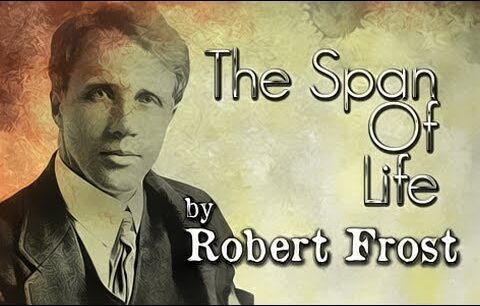Frost wrote these lines for a pageant at Plymouth, Massachusetts, celebrating the three-hundredth anniversary of the arrival of the Mayflower from England.
Immigrants
No ship of all that under sail or steam
Have gathered people to us more and more
But Pilgrim-manned the Mayflower in a dream
Has been her anxious convoy in to shore.
To find this poem—this performance in words—of any interest, a reader probably has to know that the Mayflower brought the Pilgrims to America. Second, a reader has to grasp a slightly unfamiliar construction:“No ship . . . but . . . has . . .” which means,in effect,“every ship has.”(Compare:“No human being but is born of woman,”which means “Every human being is born of woman.”)
If, then, we paraphrase the poem—translate it into other words in the same language—we get something roughly along these lines:
All of the ships (whether sailing vessels or steamships) that have collected people in increasing numbers and brought them to this country have had the Mayflower, with its Pilgrims, as its eager (or worried?) escort to the coast.
We have tried to make this paraphrase as accurate and as concise as possible, but for reasons that we’ll explain in a moment,we have omitted giving an equivalent for Frost’s “in a dream.”Why, one might ask, is our paraphrase so much less interesting than the original?
We come back to Frost’s idea that a work of literature is a “performance in words.” The lines are metrical (stresses recur more or less regularly) and they rhyme (steam/dream, more/shore), which is to say Frost, like a figure-skater, has created patterns. Probably, too, the repetition, of s in “sail or steam” catches the ear.The words “sail” and “steam” are somewhat alike in that they are both monosyllables, they both begin with the same sound, and they both evoke images of ships.Compare “sail or steam” with “sail or oil” or “sail or engine”and you will probably agree that the original is more pleasing and more interesting.
We can’t be certain about what Frost really thought of the Pilgrims and of the Mayflower, but we do have the poem, and that’s what we are concerned with. It celebrates the anniversary, of course, but it also celebrates at least two other things: the continuing arrival of new immigrants and the close connection between the early and the later immigrants.
Persons whose ancestors came over on the Mayflower have a reputation for being rather sniffy about later arrivals, but Frost reminds his Yankee audience that their ancestors, the Mayflower passengers, were themselves immigrants.
However greatly the histories and the experiences of the early immigrants differed from those of later immigrants, the experience of emigration and the hopes for a better life link the Mayflower passengers with more recent arrivals.
The poem says, if our paraphrase is roughly accurate, that the Mayflower and its passengers accompany all later immigrants. Now, what does this mean? Literally, of course, it is nonsense.The Mayflower and its passengers disappeared centuries ago.
TOPICS FOR CRITICAL THINKING AND WRITING
1. In our paraphrase, in an effort to avoid complexities, we did not give any equivalent for “in a dream” (line 3).The time has now come to face this puzzle:“But Pilgrim-manned the Mayflower in a dream.” Some readers take Frost to be saying that the long-deceased passengers of the Mayflower still dream of others following them. Other readers, however, interpret the line as saying that later immigrants dream of the Mayflower. Now, this paraphrase, even if accurate, makes an assertion that is not strictly true, since many later immigrants probably had never even heard of the Mayflower. But in a larger sense the statement is true.
Most later immigrants, with the terrible exception of involuntary immigrants from Africa who were brought here in chains, dreamed of a better life, just as the Mayflower passengers did. Some hoped for religious freedom, some hoped to escape political oppression or starvation, but again, all were seeking a better life.What do you make of line 3?
2. In our paraphrase we mentioned that “anxious” might be paraphrased either as “eager”or as “worried.”(Contrast, for instance,“She was anxious to serve the community” and “She was anxious about the exam.”) Is Frost’s “anxious convoy”eagerly accompanying the ships with immigrants,or is it nervously accompanying them, perhaps worried that these new arrivals may not be the right sort of people, or worried that the new arrivals may not be able to get on in the new country? Or does the word “anxious,” which seems to modify “convoy”(here,Mayflower), really refer to the new immigrants,who are worried that they may not succeed? Or perhaps they are worried that America may not in fact correspond to their hopes.
Read the poem aloud two or three times, and then think about which of these meanings—or some other meanings that you come up with you find most rewarding.You might consider, too, whether more than one meaning can be present. Frost himself in a letter wrote that he liked to puzzle his readers a bit—to baffle them and yet (or thereby) propel them forward:
My poems—I should suppose everybody’s poems—are all set to trip the reader head foremost into the boundless. Ever since infancy I have had the habit of leaving my blocks carts chairs and such like ordinaries where people would be pretty sure to fall forward over them in the dark. Forward, you understand,and in the dark.
What we have been saying is this:A reader of a work of literature finds meanings in the work, but also (even when the meaning is uncertain) takes delight in the details, takes delight in the way that the work has been constructed, takes delight in (again) the performance. When we have got at what we think may be the “meaning” of a work,we do not value or hold on to the meaning only and turn away from the work itself; rather, we value even more the craftsmanship that the work displays. And we come to see that the meaning is inseparable from all of the details that go to make up the work.
3. “Pilgrim-manned”may disturb some readers. Conscious of sexist language, today we try to avoid saying things like “This shows the greatness of man” or “Man is a rational animal” when we are speaking not about males but about all people. Does Frost’s “Pilgrim-manned” strike you as slighting women? If not,why not?
4. We have already mentioned that Frost’s poem cannot possibly be thought to describe involuntary immigrants. Is this a weakness in the poem? If so, how serious a weakness?
5. Frost’s poem celebrates immigration and does not consider its effect on the Native American population.The poem does not, so to speak, tell the whole truth; but no statement,however long, could tell the “whole truth” about such a complex topic. Do you agree that if the poem doesn’t give us the whole truth, perhaps we get enough if it reminds us of a truth?


